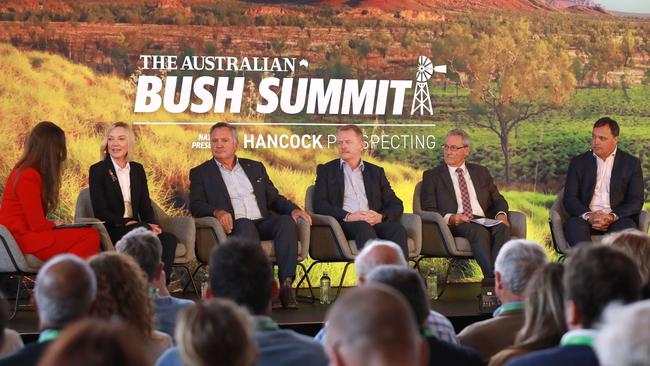Bush Summit: United call to close the divide between city and the bush
Farmers, mayors, doctors and Australia’s richest person have all united to call for a better deal for the regions in an effort to close the divide between bush and city life.

Farmers, mayors, doctors and Australia’s richest person have all united to call for a better deal for the regions in an effort to close the divide between bush and city life.
A perceived vast gap in services and living standards between regional Western Australia and the Perth metropolitan area was a key focus of Monday’s inaugural WA instalment of the Bush Summit.
While regional WA, with its mining, oil and gas and agriculture interests, is the economic backbone of the state, the summit heard it still lagged the city in many essential services and infrastructure.
Hancock Prospecting chair Gina Rinehart, who has an estimated net wealth of more than $37bn, used a rare public speech to push for regional Australia to receive a greater share of the wealth it generates for the country.
The standard of services in regional WA were a key theme of Monday’s Bush Summit, with representatives from across the state lamenting what they said was the insufficient resourcing in the regions.
The lack of services in turn was making it harder to attract and retain people in regional centres, which was then further exacerbating the issue.
Peter Long, the mayor of the Pilbara mining town of Karratha, said the liveability divide between country towns and capital cities was “getting worse”.
Local governments, he said, needed to be given more power to generate their own sources of revenue so that they could further develop their towns and increase liveability.
Giving councils a greater share of the GST that was generated from their regions could be one such option.
“It comes down to generating our own income,” Mr Long said.
The region’s biggest issues were “housing, housing and housing”, he said, calling on government and industry to do more to develop homes in the regions to help ensure that expectations could be met.
The chairman of the WA Country Health Service, Neale Fong, told the summit that while health workers deserved higher salaries, more money alone was not the solution to luring healthcare workers to the regions.
Instead, more focus on delivering secure and attractive housing for doctors and nurses in the regions could go a long way to tackling the staffing issues that had long been felt in WA’s regional hospitals.
There was anger expressed over the WA government’s steps immediately after their resounding 2021 state election win to dismantle the electoral system that gave the regions increased representation in the WA parliament’s upper house.
Pastoralists and Graziers Association of WA president Tony Seabrook – who was the most prominent critic of the WA government’s now-abandoned Aboriginal Cultural Heritage Act – attacked the government over what he said was its lack of engagement with farmers.
“There’s a shallowness of the current government standing up and saying they support what we do, when they don’t,” Mr Seabrook said.
“What the government has done in taking away our representation is basically say ‘We don’t care about the bush’.
“It’s the parliament of the metropolitan area – we don’t have a say there, and for them to offer platitudes about caring about regional Australia … They don’t give a damn.”
Additional reporting: Paige Taylor, Charlie Peel




To join the conversation, please log in. Don't have an account? Register
Join the conversation, you are commenting as Logout